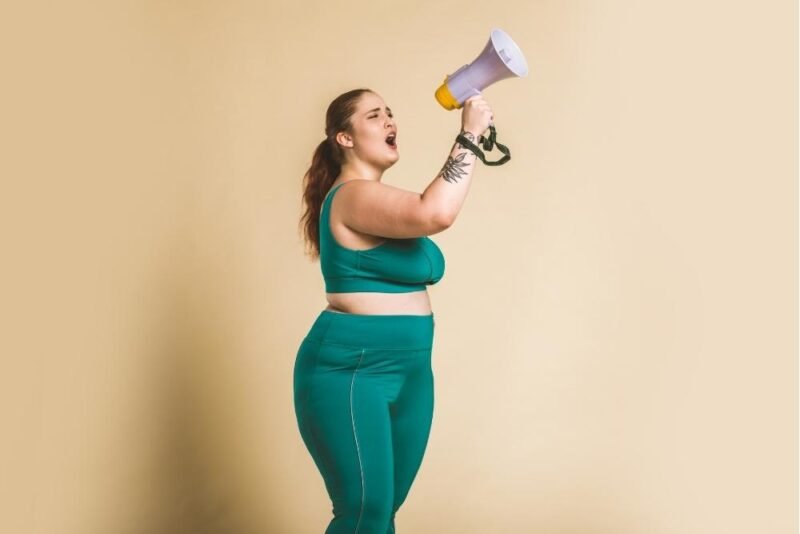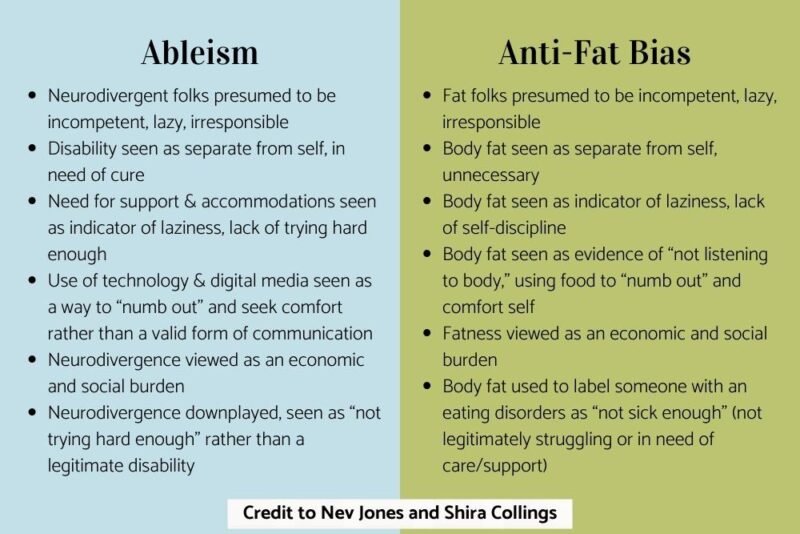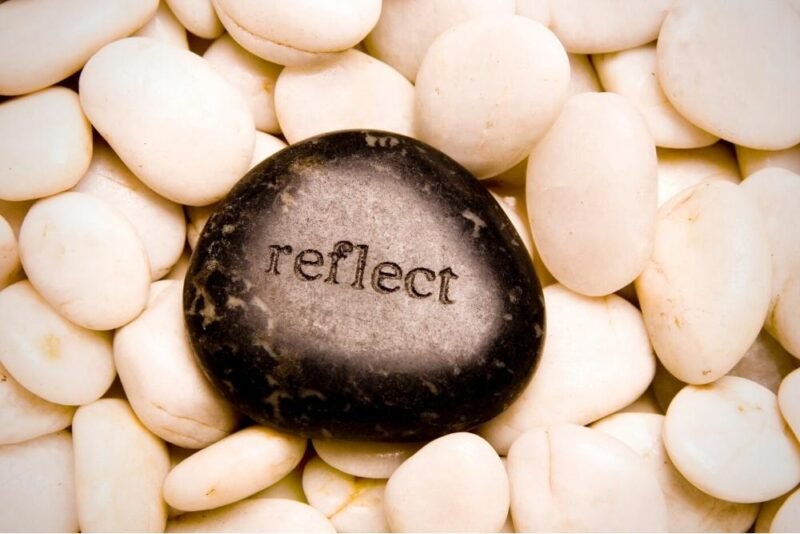
The subject matter of this blog site submit is one particular I only started off to check out myself in the previous 12 months or so. I was shocked, at first, when it sunk in how ableist diet program culture is, with healthism and anti-fatness/sizeism as the hyperlinks. I realized how ablest (and healthist) my possess pondering was back again when I was deeply enmeshed in food plan tradition, myself. And now that I see this darker aspect of eating plan tradition, I simply cannot unsee it, and I want you to see it, also.
Eating plan culture is just 1 of lots of social devices in which people are treated inequitably. It usually overlaps not just with ableism, sizeism and healthism, but also with racism, sexism, ageism and classism.
Eating plan lifestyle supports interpretations of own health and fitness selections as ethical character — it’s not just about bodyweight decline. Food plan tradition does not guidance the price of all bodies, and diet regime tradition does not exist in a vacuum.
Even if you don’t consider you to be on a “diet,” for the reason that you dwell in just diet regime lifestyle, you will even now have thoughts, beliefs and behaviors — aware or unconscious — that have been strongly influenced by diet plan society. Until you do the get the job done to cost-free by yourself, of training course.
Carefully connected to food plan tradition is exercise tradition, which, not astonishingly, is also healthist and ableist, sending refined or not-so-delicate messages that workout ought to be applied to “overcome” or steer clear of disability, since disabled bodies have a lot less value.

What is “disability”? What is “ableism”?
So, what do I imply when I say “disabled”? I’m not only chatting about needing to use a wheelchair, a walker, a cane or other mobility aid gadgets. Disabilities can be seen, or not seen. An individual with a wellness problem that influences their toughness, stamina or mobility would be disabled, and that may well not be totally noticeable. Or, somebody could be neurodivergent, which frequently is invisible.
“Neurodivergent” is phrase for persons with cognitive and/or neurological processes that differ from what is regarded — by cultural/societal and clinical requirements — to be “typical” or “normal.” This involves people with autism, ADHD, panic, melancholy and borderline identity, as effectively as men and women who are remarkably sensitive to sensory stimulation.
I located this definition by law firm and social justice activist Talila “TL” Lewis to be in-depth and effective:
“A program of assigning value to people’s bodies and minds dependent on societally built thoughts of normalcy, efficiency, desirability, intelligence, excellence, and health. These built strategies are deeply rooted in eugenics, anti-Blackness, misogyny, colonialism, imperialism and capitalism.
“This systemic oppression potential customers to people and culture analyzing people’s benefit based on their society, age, language, look, religion, birth or dwelling location, “health/wellness,” and/or their capability to satisfactorily re/develop, “excel” and ‘behave.’
“You do not have to be disabled to encounter ableism.”
What ablism and anti-fatness/sizeism have in prevalent is the great — held by the medical technique and society at big — that remaining excess fat and staying disabled are both abnormalities that the individual should operate really hard to get over. Also, that possessing a physique that is irregular in this way indicates that you are not regular, and not really human. [Note that I use the word “fat” as a neutral descriptor, like short or tall.]
Which is entire and utter bullsh*t.

A 1st glimpse at ableism and anti-unwanted fat bias
Just as you don’t have to be disabled to practical experience ableism, you do not have to be body fat to encounter anti-fat bias. If you are a slim man or woman who diet programs or routines to continue being skinny, it’s at minimum in element due to the fact you are scared of turning into fat. It may also because you are scared of starting to be “unhealthy” or experiencing a loss of mobility.
I’ve had consumers in larger sized bodies who also come about to have some mobility concerns inform me how vital it was for them to try out to stroll or move “normally.” This is much less about how motion feels in their physique, and more about how they may well be judged by other if they are body fat AND they stroll slowly. I’ve also had neurodivergent consumers in larger bodies come to feel elevated strain to mask signs of their neurodivergence.
Systemic oppression primarily based on irrespective of whether anyone adheres to societal beliefs of “normalcy” and “intelligence” impacts disabled and neurodivergent folks, as effectively as body fat men and women. This can consist of:
- Focusing on cutting down “symptoms” of neurodivergence — or on getting rid of weight — by means of nourishment interventions.
- Seeing neurodivergence — or “excess” physique body fat — as anything to “cure.”
- Focusing only on how neurodivergent and fat people today can cope in an ableist/anti-unwanted fat globe alternatively of focusing on producing the entire world much more accessible and friendly to a assorted selection of folks.
On that previous point, people today living in extra fat bodies may possibly have issues obtaining pleasing dresses (or any apparel that are not custom-manufactured) that suit. They might dread likely to eating places, theaters or on airplanes for the reason that they know (or are not positive) if the chairs or seat will accommodate their bodies. People today dwelling with a bodily incapacity may perhaps also have problems acquiring clothes and seats (or full properties) that are made to meet their requirements.

How healthism performs a connecting purpose
Healthism is a philosophy that overemphasizes person duty in overall health outcomes and prioritizes pursuing wellness earlier mentioned all else. This can include things like:
- Demonizing having for pleasure, pleasure, comfort, or stimulation. (There must be no shame in finding enjoyment/joy/comfort and ease from food items, and food items can be an important sort of stimulation, or stimming, for some neurodivergent people.)
- Shaming folks for picking out comfort meals, inspite of the fact these meals might be pleasurable, and may be a preserving grace for chaotic folks as perfectly as individuals who obtain it hard mentally or physically to prepare dinner a food “from scratch.”
- Seeing wellbeing (and the pursuit of health and fitness) as a ethical obligation.
I have a ton to say on that very last level, but let’s commence by pointing out what may possibly be evident: Numerous individuals are (reluctantly) keen to give fats folks a pass “as very long as they’re wholesome.” This is portion of the “superior fatty” trope — be energetic, desirable and successful, and do not accept your existing entire body as Okay. (If you’re fat and dare to like you, another person may well accuse you of “glorifying being overweight.”
I have experienced numerous customers in bigger bodies notify me they come to feel they want to appear like they are making an attempt to lose bodyweight or “get healthy” — buying the salad, likely to the gymnasium, bragging about their superb cholesterol and blood sugar degrees — even when they are in the course of action of unsubscribing from food plan culture and producing peace with meals and their bodies.
When somebody “concern trolls” a fats human being on social media (or elsewhere), what do they say? Ordinarily a little something like, “but you’re not healthy” or “you’re heading to get diabetic issues.” Yep, ableism (and healthism) are inherently baked into anti-fatness.
While it’s correct that pounds and wellness are not intently linked (affiliation does not establish causation), I have come to comply with statements I make about that position with yet another assertion that can be even head-blowing: being healthy and/or pursuing health and fitness is not a ethical crucial.
Mic drop.

Wellbeing isn’t a guarantee, or a measure of worthiness
Really merely, “health,” as it is commonly described, is not a source that is accessible to anyone. Some people never have that useful resource. Other persons intermittently have it. Continue to other individuals have it for a although, then do not have it, and never have it once more.
Like it or not, if we are fortunate sufficient to dwell very long adequate, issues are likely to happen to our bodies. We may come across that our joints ache, that we gain fat, that our blood strain trends higher, that we need to have to use a walker or a wheelchair, that we get most cancers. Our bodies are no fewer worthy. We are no less deserving.
When I was still accomplishing “non-diet plan bodyweight management” (which I at some point recognized was not a detail) I would frequently assistance purchasers established “meaningful” plans. In other phrases, alternatively of utilizing fitting into “skinny jeans” as a intention, we would use “keeping up with your kids” as a aim. Yep, which is fully ableist. Some mothers and fathers will by no means be able to “keep up with” their kids or get down on the floor to participate in with their young ones. That doesn’t make them bad or ineffective mom and dad.
Fat persons and neurodivergent persons have usually existed, so alarmist headlines (and the public health machinations behind them) about the “ob*sity epidemic” or the “autism epidemic” genuinely distribute the thought that anyone who diverges from what has been labeled “normal” ought to be removed or erased. We noticed this obviously in one particular not-so-charming chapter of our country’s background associated what have been identified as “ugly laws.”
From 1867 to the beginning of Earth War I, some U.S. towns enacted so-termed “ugly laws” banning persons considered “diseased, maimed, mutilated or in any way deformed so as to be an unattractive or disgusting item or inappropriate person” from general public areas. Although these laws grew to become considerably less enforced in excess of time, Chicago did not repeal its “ugly law” until eventually 1974, when an alderman took up the bring about, contacting the regulation “cruel and insensitive” and “a throwback to the Middle Ages.”

A second seem at ableism and anti-fatness
For this segment, and the graphic over, I give significant credit history to mental overall health researcher and professor Nev Jones and therapist Shira Collings, who gave a chat with each other at an RDs for Neurodiversity meeting I attended before this year.
They said the notion of “excess” is an fundamental thread beneath anti-extra fat bias and ableism. Overall body fat/fatness is found as extra human body tissue, and as a final result of abnormal taking in. The concept is also that the overall body by itself is pretty much “excess” – that system dimensions is impartial of who we are. Very same with neurodiversity – incapacity and incapacity accommodations as an “excess,” lodging as unwanted.
Each body fat and neurodivergent people face objectification and disempowerment, as they are not viewed as the industry experts on their personal wants. I believe this is legitimate for individuals who have other forms of disability, as well.
Jones and Collings pointed out that neither system unwanted fat or neurodivergence are issues that have to have to be cured or removed, and that our bodies are parts of our minds and ourselves.
- Our cognition (wondering) is influenced by our bodies, and body weight suppression can have a substantial unfavorable influence on our thinking.
- When anyone is within their established issue range—which might entail currently being fat—this is needed and in truth essential to how they purpose and who they are.
There is some critical foods for imagined there.

So now what? Ways to mirror
Did this submit sense like a ton? If it did, that is Alright. I hope it opens a doorway to checking out your personal ideas, thoughts, beliefs and assumptions about what bodies (and minds) are deserving and precious. Right here are some thoughts to get you pondering:
- What strategies of being unique get labeled as “bad” or “inferior” in our modern society? Do you agree or disagree with these labels?
- In what ways do you label other men and women as remaining fewer deserving? Do you sense like you do this consciously, or unconsciously (like possibly you absorbed these suggestions from culture but haven’t truly examined or questioned them)? How are these men and women unique from you? Do you discover any fear that you may possibly sometime be like these people today?
- Ought to folks have to improve their bodies or minds to “fit in,” or should our society and its devices evolve to be extra inclusive of all sorts of individuals?
- Do you choose (consciously or unconsciously) persons who are “unhealthy”? Do you make a distinction involving having a disease or incapacity that is “preventable” vs. a person which is not? Why?
- Do you think it’s a moral crucial to pursue health and fitness? Why or why not? If you do, how does this align (or conflict) with other beliefs you have about human body autonomy?
- Do you feel that we have own command more than our well being? If indeed, can you feel of any or illustrations exactly where which is not the scenario?
- If you know that you judge people today dependent on their sizing, ability, overall health or other components, how does that make you come to feel? Have you been judged by other folks (or your self) centered on anything about you that is different? How did that make you feel?
- Do you stand opposed to some varieties of oppression (say, racism) but locate that you let other kinds of oppression slide by? Why?
Some of these inquiries may well expose responses about your self that make you cringe. If so, that is Ok. Technique them with curiosity and self-compassion, and if you discover that you have some beliefs or mindsets that will need to alter, then begin to change them. If we aren’t mindful of our views, emotions, beliefs and behaviors, then we stay trapped. Awareness (again, paired with curiosity and self-compassion) opens the door to understanding improved, and doing far better.
Carrie Dennett, MPH, RDN, is a Pacific Northwest-based registered dietitian nutritionist, freelance author, intuitive having counselor, author, and speaker. Her superpowers include things like busting diet myths and empowering girls to truly feel far better in their bodies and make food stuff options that help enjoyment, diet and health and fitness. This article is for informational purposes only and does not represent individualized diet or health-related assistance.
 Print This Publish
Print This Publish







More Stories
Neck Muscle Exercises For Growth – How to Build an 18 Inch Neck!
Red Flags and Warning Against Secret Alcoholism
A Comprehensive Guide to Car Insurance